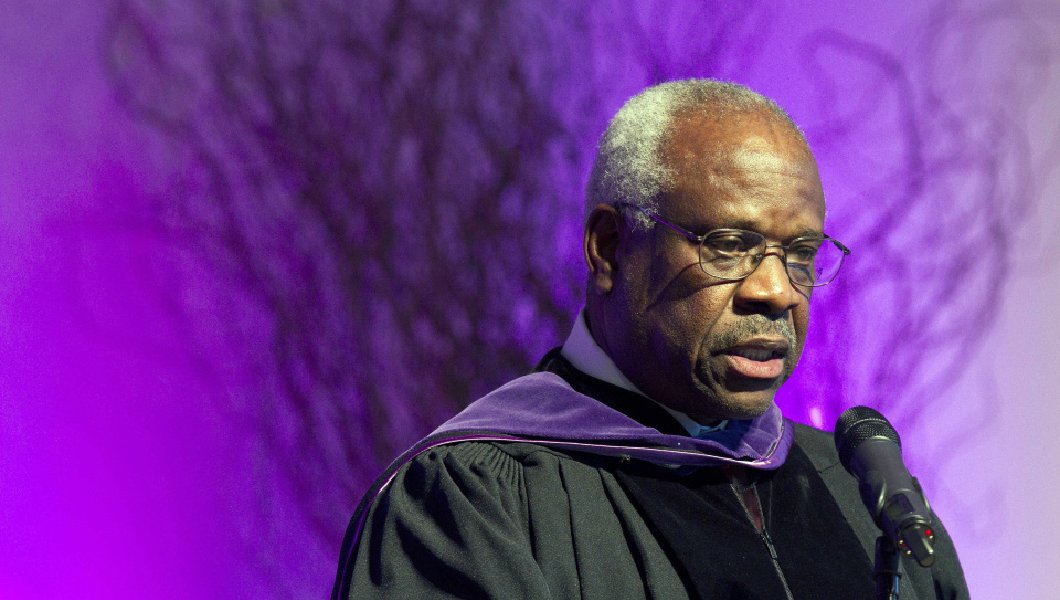Clarence Thomas, Gay Marriage and the Declaration of Independence
By Scott Douglas Gerber
WashingtonExaminer.com

Not surprisingly, the U.S. Supreme Court's
landmark 5-4 ruling that the Constitution guarantees
a right to same-sex marriage has generated a lot of
reaction. What is surprising, however, is that, as
far as I can tell, no one has commented on how
prominent a role the Declaration of Independence
played in Justice Clarence Thomas's dissenting
opinion in the case. Never before has a Supreme
Court justice cited the Declaration so frequently,
and it is important to understand the reason Thomas
did so, especially as the nation celebrates the
anniversary of our founding document on the Fourth
of July.
Justice Thomas opened and closed his opinion by
invoking the Declaration, and the bulk of his
dissent was devoted to explaining why: Because, in
his judgment, "Our Constitution — like the
Declaration of Independence before it — was
predicated on a simple truth: One's liberty, not to
mention one's dignity, was something to be shielded
from — not provided by — the State. Today's decision
casts that truth aside."
Thomas's commitment to the Declaration of
Independence traces to his days as chairman of the
U.S. Equal Employment Opportunity Commission during
the Reagan Administration. There, he immersed
himself in literature about the nation's founding
document to try to find solutions to the problem of
discrimination in America. His critics strived
during his Supreme Court confirmation process to
mischaracterize his views about it.
Harvard Law School Professor Laurence Tribe, for
example, wrote in a scathing New York Times op-ed
that Thomas would use the Declaration to turn back
the clock to the darkest days of the nation's
history: "Most conservatives criticize the judiciary
for expanding its powers, 'creating' rights rather
than 'interpreting' the Constitution. … Clarence
Thomas, judging from his speeches and scholarly
writings, seems instead to believe judges should
enforce the Founders' natural law philosophy — the
inalienable rights 'given man by his Creator' —
which he maintains is revealed most completely in
the Declaration of Independence."
What critics such as Tribe failed to mention was
that Thomas was articulating the standard
Anglo-American conception of liberty in his speeches
and writings about the Declaration. Indeed, Thomas
made this point repeatedly during his confirmation
battle. For instance, when asked by then-Senator
Howard Metzenbaum, D-Ohio, about a speech he had
previously given,
Thomas responded: "[T]he point I think throughout
these speeches is a notion that we should be careful
about the relationship between the government and
the individual and should be careful that the
government itself does not at some point displace or
infringe on the rights of the individual. That is a
concern, as I have noted here, that runs throughout
my speeches."
Justice Thomas's gay marriage dissent is a tour de
force on the relationship between the individual and
the government, especially in its discussion of the
writings of John Locke, the 17th century English
philosopher whose ideas about government influenced
America's founders more than any other. As Thomas
himself put it, "The founding-era understanding of
liberty was heavily influenced by John Locke, whose
writings 'on natural rights and on the social and
governmental contract' were cited '[i]n pamphlet
after pamphlet' by American writers."
Perhaps most important of all, Justice Thomas's
commitment to the Declaration of Independence has an
impressive pedigree: Thomas Jefferson, the
Declaration's author, characterized our founding
document as "an expression of the American mind;"
Abraham Lincoln, America's only true poet/president,
described the Declaration as an "apple of gold" and
the Constitution as the "frame of silver" around it;
and Martin Luther King Jr. constructed the most
famous speech of the 20th century, "I Have a Dream,"
around the promise of equality to which the
Declaration dedicated the nation.
In short, what Jefferson meant to the Declaration of
Independence in the 18th century, and what Lincoln
and King meant to it in the 19th and 20th centuries,
Clarence Thomas means to it today. And while Justice
Thomas's was a dissenting opinion in the gay
marriage case, I couldn't help but notice that
Justice Antonin Scalia — long a critic of Thomas's
attempts to weave the principles of the Declaration
into the fabric of American law — not only joined
Thomas's dissent in its entirety but also invoked
the Declaration in a separate dissenting opinion of
his own.
English writer G. K. Chesterton famously remarked
that "America is the only nation in the world that
is founded on a creed. That creed is set forth with
dogmatic and even theological lucidity in the
Declaration of Independence; perhaps the only piece
of practical politics that is also theoretical
politics and also great literature." Whatever one
thinks of the Supreme Court's recent gay marriage
decision, Justice Thomas's dissenting opinion in the
case needs to be understood for what it is: The most
significant public pronouncement about the
Declaration of the 21st century.
Scott Douglas Gerber is a law professor at Ohio
Northern University. His eight books include "First
Principles: The Jurisprudence of Clarence Thomas."
Thinking of submitting an op-ed to the Washington
Examiner? Be sure to read our guidelines on
submissions.

